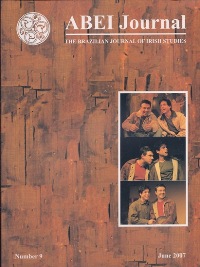Thomas Kilroy’s The Shape of Metal: “Metal … Transformed into Grace” – Grace into Metal
DOI:
https://doi.org/10.37389/abei.v9i0.3694Palavras-chave:
Thomas Kilroy, The Shape of Metal, FailureResumo
Thomas Kilroy in The Shape of Metal, probes into the age-old problems
of the relationship between art and life, artist and human being, physical reality and its transcendence, throwing new light on the many ambiguities involved. The essay examines some of the ways Kilroy dramatizes the experience of human and artistic failure through the protagonist, an old female sculptor, and the evocation of giant artists, from Michelangelo through Giacometti to Beckett and argues that the achievements and artistic principles of these artists highlight some of Kilroy’s own drama-forming principles as well as aspects of his theatricality.
Referências
Beckett, Samuel. Endgame. New York: Grove Press, 1958.
____. and Georges Duthuit. “Three Dialogues.” Samuel Beckett. A Collection of Critical Essays. Ed. Martin Esslin. Englewood Cliffs, N.J: Prentice-Hall, 1965. 16-22.
Deutsch, Eliot. Essays on the Nature of Art. New York: State University of New York Press, 1996.
Heidegger, Martin, Poetry, Language, Thought. New York: Harper & Row, 1971.
Hohl, Reinhold. Alberto Giacometti. New York: Harry N. Abrams, 1971.
Giedion-Welker, Carola. Constantin Brancusi. Trans. Maria Jolas and Anne Leroy. New York: George Braziller, 1959.
Grene, Nicholas. “Staging the Self: Person and Persona in Kilroy’s Plays.” Irish University Review. 32. 1 (Spring/Summer 2002): 70-82.
Kiberd, Declan. Inventing Ireland. Cambridge, MA: Harvard University Press, 1996.
Kilroy, Thomas. My Scandalous Life, Dublin: Gallery Press, 2004
____. The Madam MacAdam Travelling Theatre, London: Methuen, 1991.
____. The Secret Fall of Constance Wilde. Dublin: Gallery Press, 1997.
____. The Shape of Metal. Dublin: Gallery Press, 2003.
____. “Synge and Modernism.” J. M. Synge: Centenary Papers 1971. Ed. Maurice Harmon. Dublin: Dolmen, 1972. 167-76.
____. “’The Whole Idea of Writing Historical Fiction is Paradoxical.’ Talk with Irish Playwright Thomas Kilroy.” Interview with Mária Kurdi. Hungarian Journal of English and American Studies, 8,1 (Spring 2002): 259-67.
____. “Thomas Kilroy: An Interview.” Interview with Anthony Roche. Irish University Review. 32. 1 (Spring/Summer 2002): 150-58.
____. “Two Playwrights: Yeats and Beckett.” Myth and Reality in Irish Literature. Ed. Joseph Ronsley.
Waterloo, Ontario: Wilfrid Laurier University Press, 1977. 183-95.
Lucie-Smith, Edward. Movements in Art since 1945. London: Thames and Hudson, 1969.
Moore, Henry. Extract on Michalengelo’s Pieta. qtd. in Programme Notes to The Shape of Metal, Dublin: Abbey Theatre, 2003. 13.
Murray, Christopher, “Thomas Kilroy: the Artist and the Critic.” Irish University Review. 32. 1 (Spring/Summer 2002): 83-94.
____. “Thomas Kilroy.” The UCD Aesthetic. Celebrating 250 Years of UCD Writers. Ed. Anthony Roche, Dublin: New Island, 2005. 173-82.
Murphy, Paula. “Beauty and Deformity: A Note on Sculpture.” Programme Notes to The Shape of Metal, Dublin: Abbey Theatre, 2003. 10-12.
Ó Dochartaigh, Liam, Caol na mBréag: “Gaelic Themes in the Rough Field.” Well Dreams. Essays on John Montague. Ed Thomas Dillon Redshaw. Omaha, Nebrasca: Creighton University Press, 2004. 194-210.
O’Reilly, Anne F. Sacred Play. Dublin: Carysfort, 2000.
Ross, Stephen David. A Theory of Art. Albany: State University of New York Press, 1982.
Shuttleworth, Ian. “The Shape of Metal. Abbey Theatre, Dublin.” The Financial Times, 10/01/2003. http:www.accessmylibrary.com/coms2/summary_0286-24544929_ITM, Jan 30, 2007.


